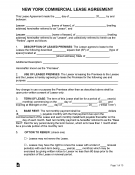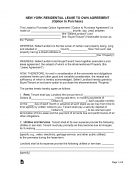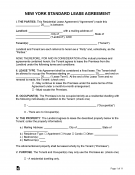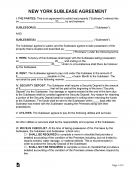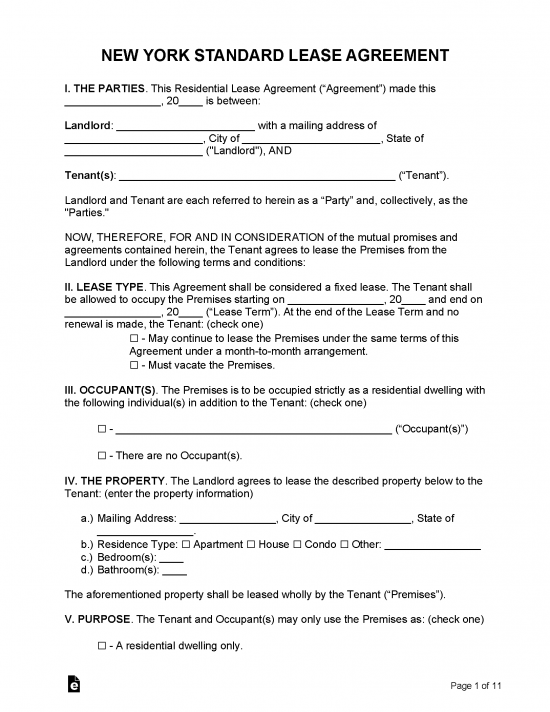New York lease agreements are contracts that set the terms of a tenant’s lease of a landlord’s property. Terms like the monthly rent and which party is responsible for utilities are usually included, as well as others more specific to the property involved. Because the lease agreement contains an explanation of the obligations of both the landlord and the tenant, both parties should keep a copy and refer to it in the event of a dispute.
Contents
- New York Lease Agreements: By Type (6)
- Landlord-Tenant Laws
- Handbooks and Guides
By Type (6)
- Commercial Lease Agreement
- Month-to-Month Lease Agreement
- Rent-to-Own Lease Agreement
- Roommate Lease Agreement
- Standard Lease Agreement
- Sublease Agreement
Download: Adobe PDF, MS Word, Rich Text Format
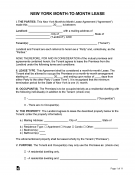 Month-to-Month Lease Agreement
Month-to-Month Lease Agreement
Download: Adobe PDF, MS Word, Rich Text Format
Download: Adobe PDF, MS Word, Rich Text Format
Download: Adobe PDF, MS Word, Rich Text Format
Download: Adobe PDF, MS Word, Rich Text Format
Download: Adobe PDF, MS Word, Rich Text Format
Landlord-Tenant Laws
Statutes – General Obligations, Article 7 (Obligations Related to Property Received as Security), Real Property, Article 7 (Landlord and Tenant); Real Property Actions and Proceedings, Article 7 (Summary Proceeding to Recover Possession of Real Property)
Required Disclosures (9)
Allergen Hazards (New York City only) – Landlords are required to make annual inspections of units to check for conditions that could reasonably cause a foreseeable allergen hazard, and must make this obligation clear to tenants in a lease agreement. (NYC Admin Code § 27-2017.1)
Bedbug Disclosure (New York City only) – Landlords must include in the lease agreement a statement disclosing the dwelling unit’s history of bedbug infestations. (NYC Admin Code § 27–2018.1)
Copy of Signed Lease (Rent Stabilized Tenants in New York City only) – Under the New York City Tenants’ Rights Guide, landlords must give rent-stabilized tenants a signed copy of their lease, as well as a lease “rider” summarizing their rights and the method of calculating their rent, within thirty (30) days of the beginning of the tenancy.
Lead-Based Paint Disclosure – Under federal law, landlords leasing properties with dwelling units built before 1978 must disclose to tenants the risks of living in structures with lead-based paints.
Security Deposit Receipt – If a landlord requires a security deposit, the landlord must disclose to the tenant the name and address of the bank or other institution where the tenant’s deposit is being held. (§ 7-103)
Smoking Policy (New York City only) – Apartment complexes with three or more units and must develop a policy on where smoking is permitted that is consistent with state and local law, and provide it to tenants. (NYC Admin Code 5, § 17-505)
Sprinkler Disclosure – All lease agreements must disclose whether or not the dwelling unit has a functional sprinkler system. (Article 7, Section 231-A)
Stove Knob Covers (New York City only) – In leases of units with gas-powered stoves where the landlord knows or reasonably should know that the tenants include children under the age of six (6), the landlord must offer the tenant stove knob covers. (NYC Admin Code § 27-2046.4(a))
Window Guards (New York City only) – In leases to tenants that the landlord knows or reasonably should know to include children under the age of ten (10), the landlord is required to install window guards. Landlords are also required to install window guards in the dwelling unit of any tenant that specifically requests them, whether or not the tenant has young children. (NYC Admin Code § 27–2043.1)
Security Deposit Laws
Maximum Amount ($)
Landlords seek a security deposit of no more than one (1) month’s rent unless the deposit or advance is for a seasonal use dwelling unit. (Real Prop. § 7-108)
Returning to Tenant
Landlords that required a security deposit must return the deposit to the tenant within fourteen (14) days. Landlords may retain all or a portion of the deposit only for unpaid rent, damage to the property other than wear and tear, failure to pay utility charges that the lease agreement explicitly made the tenant’s responsibility, and any costs of moving or storing tenant’s personal property.
With regard to costs related to damage to the property, landlords must offer tenants an opportunity for an inspection of the premises at the beginning of a tenancy and, if the tenant accepts, the landlord must also offer the tenant an opportunity for an inspection at the end of the lease; the tenant may not be held responsible for conditions that existed at the beginning of the lease. Whether or not the tenant sought an inspection at the beginning of the lease, the landlord must give the tenant an opportunity for an inspection at least two (2) weeks before the termination of the lease, and give the tenant an opportunity to cure any defect noted in such an inspection. If a landlord chooses to retain a portion of the deposit, the landlord must provide the tenant with a written itemization of all deductions, also within fourteen (14) days. (Real Prop. § 7-108)
When is Rent Due? (grace period)
Rent is due on the date specified in the lease agreement. Rent in New York is not considered late if paid within five (5) days of the due date. (Real Prop. §7-238A)
Eviction Notice (non-payment)
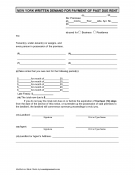 14-Day Notice to Pay or Quit – If a tenant does not pay rent on the date due, the landlord or the landlord’s agent may deliver to the tenant a notice stating that, if rent is not paid within fourteen (14) days of receipt of the notice, then the landlord may terminate the lease and begin eviction proceedings (Real Prop. Acts §7-11)
14-Day Notice to Pay or Quit – If a tenant does not pay rent on the date due, the landlord or the landlord’s agent may deliver to the tenant a notice stating that, if rent is not paid within fourteen (14) days of receipt of the notice, then the landlord may terminate the lease and begin eviction proceedings (Real Prop. Acts §7-11)
Download: Adobe PDF
Maximum Fees ($)
Late Rent Penalties
If a tenant provides rent more than five (5) days after the date it is due, a landlord may charge a late fee up to $50 or five percent (5%) of the rent, whichever is less. (Real Prop. §7-238A)
NSF Checks
Landlords may not charge tenants a penalty for bouncing a check but may recover from tenants the actual cost endured for receiving the check with insufficient funds.
Tenant’s Unclaimed Property
New York State has few statutes on personal property left behind by tenants. In cases of eviction, the property will be collected by marshalls or constables, who will collect the property and bill the landlord for the cost of storing it, a cost that landlords may later seek reimbursement for from tenants. (Real Prop. Acts §7-11)
Although, in cases of personal property left after the scheduled end of a lease agreement, landlords and tenants should set the terms in the lease agreement. If not addressed, best practice for a landlord is to store property that does not appear to be refuse in a safe, secure and dry location, then notify the tenant in writing at the last known address.
